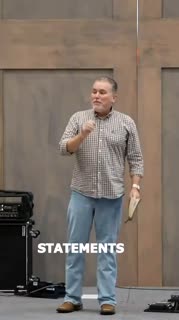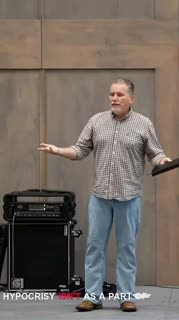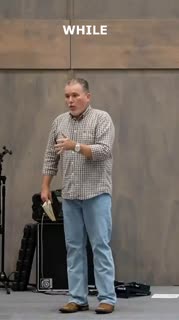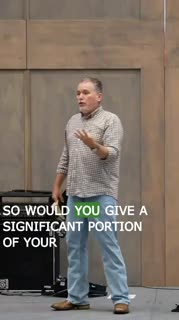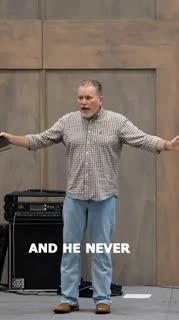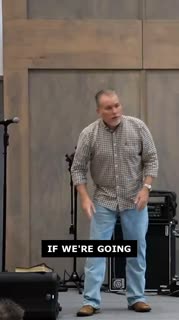Authenticity in Faith: Confronting Hypocrisy Together
Devotional
Sermon Summary
Bible Study Guide
Sermon Clips
Here are the selected quotes from the sermon transcript:
1. "Blanket statements generally aren't true. They're just way too broad. Like if you're married, like you've you've understand that like the destructive power. Of a blanket statement, right? Like you're in an argument with your spouse and your spouse looks at you and she says a blanket statement. She says, well, like you never empty the dishwasher. And now you're now you're offended. And you're like, well, hey, in twenty eighteen, when you went to your mom's house and I was home alone, I emptied the dishwasher. Right. Don't tell me I never do it. And all of a sudden it's just like it's the it's the spirals out of control. You always say that when we fight. If if you would just one time do such and such blanket statements just never go well because they're not true." [00:03:57] (48 seconds)
2. "Hypocrisy isn't as a part of christianity hypocrisy is a part of the human experience every human says one thing at some point in their life i believe this or i i think this is true and they do something different but when you're a person of faith and you bring faith into the mix of that human experience where sometimes we don't match what we say and what we do it just elevates and it heightens but it's we see hypocrisy all the time it's not just limited to faith we see it right now like in the news you're probably aware of this a couple of weeks ago a bill was passed uh tiktok is now on its way to being banned in america y 'all can hug it out right now if you want to like i know it's going to be painful gonna go through the legal process you still got some time to see what happens but it's going to be banned in america because it's dangerous to americans that's that's the quote because tiktok is going to be gotten rid of because it's a security threat to our country i don't know how it all works i don't know the details but here's what i find interesting while the law went into place or was voted on ratified here recently the conversation started a couple years ago and the conversation with the administration currently publicly said the same things hey we're gonna we're gonna move towards a ban because tiktok is dangerous tiktok is a security risk one month prior to that public statement by the press secretary we were talking about how the current administration was using tiktok influencers specifically and strategically to gain votes of the younger generation so in one month's time we hear tiktok is dangerous tiktok is security one month before we're going but we're using it for us ourselves right like that's that is what people see and they go you say you believe something but your actions do something different and listen it is across the political divide it's not just this administration uh the the previous administration we had different party talks about faith talks about christianity currently selling bibles like american bibles" [00:05:03] (122 seconds)
3. "So while we might, as believers, get pegged with it, it is a human experience, but we should be, instead of being pegged with it, we should be the people that are setting the standard to go, you know what? Hypocrisy is awful. We hate it. And we're doing everything we can in our lives from a faith perspective, and in everything that we do to root it out. So I want you to go to Matthew chapter 23. That's what we're going to jump in and look at today. If you're new to the Bible, it can be a scary book. It's got a lot of different book names inside, a lot of chapters, a lot of verses. How do I read it? Do I read it from beginning to end? Listen, we're going to put some verses up on the screen if you don't have a Bible. Let me just kind of like demysticize the Bible. The Bible is two parts. It's the Old Testament and the New Testament. The Old Testament. The Old Testament is a collection of history and stories and songs. And it was things that God and his people, the Israelites, the Jews, it showed their relationship, how God on high relates to his people and how they relate back to him. And the whole purpose was for the rest of the world to see how God and people would interact. And so it was meant for everyone to see. Along the Old Testament, from the very beginning, there's this thread throughout that is talking about a future Messiah or a future Savior coming. His name is Jesus. And when he arrived, the New Testament began. And so you've got four books in the New Testament, Matthew, Mark, Luke, John. If you had a Bible when you were growing up or one that had the red letters in it, those are Matthew, Mark, Luke, and John, the Gospels. They tell the story of Jesus. And then the rest of the New Testament." [00:08:02] (93 seconds)
4. "That's where the word hypocrite comes from. It's the idea that I'm speaking with a mask that says one thing, but when I reveal the mask or I take it away, I'm a totally different person. That's what hypocrisy is. It's pretending to be something that you're not. It's pretending to be walking with Jesus. It's pretending to say, hey, the faith walk in my life matters when no one else sees it. And Jesus says, hey, if you are living hypocritically, trouble's coming. And so he is talking religious leaders. There are some Christians that live with hypocrisy in their life. Not all Christians, not all people everywhere. But we have to be careful that we don't become the people who say one thing with a mask on. This is what I believe. And then we do something different. Again, it's not a Christian experience. It's a human experience. But when you put faith on top of that, again, it just amps it up." [00:12:19] (54 seconds)
5. "So would you give a significant portion of your income a way to help poor people well well what do you mean by significant right like how much are we talking here all of a sudden it changes because it affects me but true christianity if you hate hypocrisy what you say you believe has to come out in what you say and what you do and jesus says this is the warning to us if you don't righteous judgments is coming it's gonna it's not gonna be great for you you because jesus is not a big fan of hypocrites here's what he says next he says for you shut the door of the kingdom of heaven in people's faces you shut the door actually what he says there he says you slam the door in people's faces there are people who want to get into the kingdom of heaven there's people around you your neighbors co -workers they're interested in the things of god they may not know that they may not verbalize it but they're looking for purpose in life they're looking for purpose in life they're looking for purpose in life they're looking for meaning they're looking for wholeness in their family they're looking for work that matters they're looking for all kinds of things that only a relationship with jesus actually unlocks for them so they may not know they're looking for it but they are and they may come to you unknowing that they're looking for the kingdom of heaven and jesus says then you slam the door in their face i don't know if you've ever had a door slammed in your face it can be pretty jarring" [00:18:25] (96 seconds)
6. "let me just throw this out there though several years ago barna did some research and david kenneman wrote a book i referenced it quite a bit it was uh it was a monumental book for its time he wrote a book it was called unchristian it was research based on how americans aged 16 to 29 so now it's i think it's like 34 to 46 year olds how they see christians and here's what they said number one hypocritical i mean that was that was the number one thing two or they weren't all in order they said that we were all we cared about was converts that we were too political that we we were anti -homosexual that we were sheltered these things that described believers and it really gave insight to the church of hey here's here's how people see us here's what what we learned if you see someone's world view how they see the world or you see something like their sexuality or their sexual preference more than you see them as a person you might be slamming the door in their face if you see a political savior a political party that's going to fix our country and everything that you believe is around this person republican or democrat they're going to be the ones if we get them in the office the country is going to be saved everything's going to be changed if you believe that and you live that out for people who are on the other side of the political aisle you may be slamming the door to conversation if you see sin in someone's life and not people you may be slamming the door and this is not a question of right and wrong it's not about calling right things wrong and wrong things right right things are right and wrong things are wrong and the bible gives us very clear pictures of what those are but jesus was a person who spent time with what the bible called tax collectors and sinners tax collectors the people who were hated and people who by their definition were called sinners like we don't even have those people like no one came to work friday and you went they walked the office you're like that's a sinner" [00:20:55] (136 seconds)
7. "And He never compromised it, yet people were drawn to Him because Jesus flung the door to the kingdom wide open. And that's why He says, you're slamming the door that I've flung wide open and that's going to cause problems for you. Because I came to seek and to save people who are lost. I came to find people who are around the world trying to figure out purpose and meaning and I came to save them, to point them to the reason why they were lost. I came so that they were created. I came so that they would know truth and who I am and that I love them and that there's an eternity for them. I want them to have all that. And I'm flinging the door wide open to love people and tell them the truth so they can accept the truth. Turn from their sin and follow me. And you guys are my followers and you're slamming the door. It's like a gunshot going off in the neighborhood and everybody's ducking. And we don't realize it because we go, we wouldn't do that. I don't want to do that. But sometimes we get so caught up in beliefs over people. And again, it doesn't mean you hear me not talking about compromising belief in any way, shape or form, but it's about loving people. And Jesus said, if you don't love people enough to fling the door wide open, you're not going to have some problems. Whoa to the people." [00:24:16] (70 seconds)
8. "who don't do that then he says this he says for you shut the door the kingdom of heaven in people's faces and here's one of the big reason why the door gets slammed you won't go in yourselves talking about the kingdom you won't go in yourselves and you don't let others enter one of the main reasons why people don't enter the kingdom of heaven is because we're not living inside the kingdom of heaven like we didn't slam the door from the inside like we slammed it shut and we're still not living it like what jesus is saying like hey hey if you're if your kingdom of heaven livers like like you you have the overflow of god's joy you've got the overflow of the love of god in your life god has poured so much into you that it's overflowing onto everybody else people are going to want what you have but but you you're not even living it you're not living an abundant life you're not living a life that looks like the spirit of god god is all over you and so when people look at your life they're like pass nah hey come to church with me wait so your life looks just like my life you just get up on sunday mornings and i sleep in pass i'll sleep in there's no difference in your life in my life except you waste a sunday morning that that's what they think because your life isn't kingdom of heaven life you're not living that that the blessings that god has for you and so what happens is we're living a life and where our life is inviting people to the party that no one wants to come to" [00:27:40] (94 seconds)
9. "So in a minute, we talk about next steps. It's not going to be on the screen. But kind of the first next step, the overarching thing, is if you're a follower of Jesus, you've got to, on a regular basis, inspect your own life to go, does my life match this book? Does my life match the life of Jesus? And if it doesn't, we're in the continual journey to adjust our life to truth rather than trying to adjust truth to our life. That's really it. The overarching thing, because Jesus is very clear, says it throughout this chapter. He says it very strongly in this passage that Christians should be haters of hypocrisy. In our own lives, we should be rooting it out. It should not be acceptable because it has other people implications. We're slamming the door on people who want the kingdom of God." [00:29:27] (56 seconds)
10. "If we're going to hate hypocrisy, we had to have open conversations with people. We've got to apologize when we are hypocritical and we've got to strive with everything we've got in us to hate the hypocrisy in our own lives. And when that happens, people will be invited to the party and they'll come. It's a story I'll close with a lady named Adele Goolsbee. Adele was a senior citizen, living in a neighborhood and everybody in the neighborhood knew Adele. Adele would be out and she'd talk to neighbors. She'd sit outside in her yard sometimes. And a couple of weeks went by and the neighbors realized we haven't seen Adele. She hadn't come out, you know, come out to the sidewalk, had to come out to visit. So they actually called the police, said, hey, we don't know if she was older or somebody. The police get to her next of kin. They call her brother. Her brother says, oh no, she's not missing. She's in a nursing home. She's just too old to live on her own anymore. So she's in a nursing home. She's not the house anymore. That's why they don't see her. I think it's relayed to the neighbors." [00:37:22] (61 seconds)
Ask a question about this sermon
1. "Blanket statements generally aren't true. They're just way too broad. Like if you're married, like you've you've understand that like the destructive power. Of a blanket statement, right? Like you're in an argument with your spouse and your spouse looks at you and she says a blanket statement. She says, well, like you never empty the dishwasher. And now you're now you're offended. And you're like, well, hey, in twenty eighteen, when you went to your mom's house and I was home alone, I emptied the dishwasher. Right. Don't tell me I never do it. And all of a sudden it's just like it's the it's the spirals out of control. You always say that when we fight. If if you would just one time do such and such blanket statements just never go well because they're not true." [00:03:57] (48 seconds)
2. "Hypocrisy isn't as a part of christianity hypocrisy is a part of the human experience every human says one thing at some point in their life i believe this or i i think this is true and they do something different but when you're a person of faith and you bring faith into the mix of that human experience where sometimes we don't match what we say and what we do it just elevates and it heightens but it's we see hypocrisy all the time it's not just limited to faith we see it right now like in the news you're probably aware of this a couple of weeks ago a bill was passed uh tiktok is now on its way to being banned in america y 'all can hug it out right now if you want to like i know it's going to be painful gonna go through the legal process you still got some time to see what happens but it's going to be banned in america because it's dangerous to americans that's that's the quote because tiktok is going to be gotten rid of because it's a security threat to our country i don't know how it all works i don't know the details but here's what i find interesting while the law went into place or was voted on ratified here recently the conversation started a couple years ago and the conversation with the administration currently publicly said the same things hey we're gonna we're gonna move towards a ban because tiktok is dangerous tiktok is a security risk one month prior to that public statement by the press secretary we were talking about how the current administration was using tiktok influencers specifically and strategically to gain votes of the younger generation so in one month's time we hear tiktok is dangerous tiktok is security one month before we're going but we're using it for us ourselves right like that's that is what people see and they go you say you believe something but your actions do something different and listen it is across the political divide it's not just this administration uh the the previous administration we had different party talks about faith talks about christianity currently selling bibles like american bibles" [00:05:03] (122 seconds)
3. "So while we might, as believers, get pegged with it, it is a human experience, but we should be, instead of being pegged with it, we should be the people that are setting the standard to go, you know what? Hypocrisy is awful. We hate it. And we're doing everything we can in our lives from a faith perspective, and in everything that we do to root it out. So I want you to go to Matthew chapter 23. That's what we're going to jump in and look at today. If you're new to the Bible, it can be a scary book. It's got a lot of different book names inside, a lot of chapters, a lot of verses. How do I read it? Do I read it from beginning to end? Listen, we're going to put some verses up on the screen if you don't have a Bible. Let me just kind of like demysticize the Bible. The Bible is two parts. It's the Old Testament and the New Testament. The Old Testament. The Old Testament is a collection of history and stories and songs. And it was things that God and his people, the Israelites, the Jews, it showed their relationship, how God on high relates to his people and how they relate back to him. And the whole purpose was for the rest of the world to see how God and people would interact. And so it was meant for everyone to see. Along the Old Testament, from the very beginning, there's this thread throughout that is talking about a future Messiah or a future Savior coming. His name is Jesus. And when he arrived, the New Testament began. And so you've got four books in the New Testament, Matthew, Mark, Luke, John. If you had a Bible when you were growing up or one that had the red letters in it, those are Matthew, Mark, Luke, and John, the Gospels. They tell the story of Jesus. And then the rest of the New Testament." [00:08:02] (93 seconds)
4. "That's where the word hypocrite comes from. It's the idea that I'm speaking with a mask that says one thing, but when I reveal the mask or I take it away, I'm a totally different person. That's what hypocrisy is. It's pretending to be something that you're not. It's pretending to be walking with Jesus. It's pretending to say, hey, the faith walk in my life matters when no one else sees it. And Jesus says, hey, if you are living hypocritically, trouble's coming. And so he is talking religious leaders. There are some Christians that live with hypocrisy in their life. Not all Christians, not all people everywhere. But we have to be careful that we don't become the people who say one thing with a mask on. This is what I believe. And then we do something different. Again, it's not a Christian experience. It's a human experience. But when you put faith on top of that, again, it just amps it up." [00:12:19] (54 seconds)
5. "So would you give a significant portion of your income a way to help poor people well well what do you mean by significant right like how much are we talking here all of a sudden it changes because it affects me but true christianity if you hate hypocrisy what you say you believe has to come out in what you say and what you do and jesus says this is the warning to us if you don't righteous judgments is coming it's gonna it's not gonna be great for you you because jesus is not a big fan of hypocrites here's what he says next he says for you shut the door of the kingdom of heaven in people's faces you shut the door actually what he says there he says you slam the door in people's faces there are people who want to get into the kingdom of heaven there's people around you your neighbors co -workers they're interested in the things of god they may not know that they may not verbalize it but they're looking for purpose in life they're looking for purpose in life they're looking for purpose in life they're looking for meaning they're looking for wholeness in their family they're looking for work that matters they're looking for all kinds of things that only a relationship with jesus actually unlocks for them so they may not know they're looking for it but they are and they may come to you unknowing that they're looking for the kingdom of heaven and jesus says then you slam the door in their face i don't know if you've ever had a door slammed in your face it can be pretty jarring" [00:18:25] (96 seconds)
6. "let me just throw this out there though several years ago barna did some research and david kenneman wrote a book i referenced it quite a bit it was uh it was a monumental book for its time he wrote a book it was called unchristian it was research based on how americans aged 16 to 29 so now it's i think it's like 34 to 46 year olds how they see christians and here's what they said number one hypocritical i mean that was that was the number one thing two or they weren't all in order they said that we were all we cared about was converts that we were too political that we we were anti -homosexual that we were sheltered these things that described believers and it really gave insight to the church of hey here's here's how people see us here's what what we learned if you see someone's world view how they see the world or you see something like their sexuality or their sexual preference more than you see them as a person you might be slamming the door in their face if you see a political savior a political party that's going to fix our country and everything that you believe is around this person republican or democrat they're going to be the ones if we get them in the office the country is going to be saved everything's going to be changed if you believe that and you live that out for people who are on the other side of the political aisle you may be slamming the door to conversation if you see sin in someone's life and not people you may be slamming the door and this is not a question of right and wrong it's not about calling right things wrong and wrong things right right things are right and wrong things are wrong and the bible gives us very clear pictures of what those are but jesus was a person who spent time with what the bible called tax collectors and sinners tax collectors the people who were hated and people who by their definition were called sinners like we don't even have those people like no one came to work friday and you went they walked the office you're like that's a sinner" [00:20:55] (136 seconds)
7. "And He never compromised it, yet people were drawn to Him because Jesus flung the door to the kingdom wide open. And that's why He says, you're slamming the door that I've flung wide open and that's going to cause problems for you. Because I came to seek and to save people who are lost. I came to find people who are around the world trying to figure out purpose and meaning and I came to save them, to point them to the reason why they were lost. I came so that they were created. I came so that they would know truth and who I am and that I love them and that there's an eternity for them. I want them to have all that. And I'm flinging the door wide open to love people and tell them the truth so they can accept the truth. Turn from their sin and follow me. And you guys are my followers and you're slamming the door. It's like a gunshot going off in the neighborhood and everybody's ducking. And we don't realize it because we go, we wouldn't do that. I don't want to do that. But sometimes we get so caught up in beliefs over people. And again, it doesn't mean you hear me not talking about compromising belief in any way, shape or form, but it's about loving people. And Jesus said, if you don't love people enough to fling the door wide open, you're not going to have some problems. Whoa to the people." [00:24:16] (70 seconds)
8. "who don't do that then he says this he says for you shut the door the kingdom of heaven in people's faces and here's one of the big reason why the door gets slammed you won't go in yourselves talking about the kingdom you won't go in yourselves and you don't let others enter one of the main reasons why people don't enter the kingdom of heaven is because we're not living inside the kingdom of heaven like we didn't slam the door from the inside like we slammed it shut and we're still not living it like what jesus is saying like hey hey if you're if your kingdom of heaven livers like like you you have the overflow of god's joy you've got the overflow of the love of god in your life god has poured so much into you that it's overflowing onto everybody else people are going to want what you have but but you you're not even living it you're not living an abundant life you're not living a life that looks like the spirit of god god is all over you and so when people look at your life they're like pass nah hey come to church with me wait so your life looks just like my life you just get up on sunday mornings and i sleep in pass i'll sleep in there's no difference in your life in my life except you waste a sunday morning that that's what they think because your life isn't kingdom of heaven life you're not living that that the blessings that god has for you and so what happens is we're living a life and where our life is inviting people to the party that no one wants to come to" [00:27:40] (94 seconds)
9. "So in a minute, we talk about next steps. It's not going to be on the screen. But kind of the first next step, the overarching thing, is if you're a follower of Jesus, you've got to, on a regular basis, inspect your own life to go, does my life match this book? Does my life match the life of Jesus? And if it doesn't, we're in the continual journey to adjust our life to truth rather than trying to adjust truth to our life. That's really it. The overarching thing, because Jesus is very clear, says it throughout this chapter. He says it very strongly in this passage that Christians should be haters of hypocrisy. In our own lives, we should be rooting it out. It should not be acceptable because it has other people implications. We're slamming the door on people who want the kingdom of God." [00:29:27] (56 seconds)
10. "If we're going to hate hypocrisy, we had to have open conversations with people. We've got to apologize when we are hypocritical and we've got to strive with everything we've got in us to hate the hypocrisy in our own lives. And when that happens, people will be invited to the party and they'll come. It's a story I'll close with a lady named Adele Goolsbee. Adele was a senior citizen, living in a neighborhood and everybody in the neighborhood knew Adele. Adele would be out and she'd talk to neighbors. She'd sit outside in her yard sometimes. And a couple of weeks went by and the neighbors realized we haven't seen Adele. She hadn't come out, you know, come out to the sidewalk, had to come out to visit. So they actually called the police, said, hey, we don't know if she was older or somebody. The police get to her next of kin. They call her brother. Her brother says, oh no, she's not missing. She's in a nursing home. She's just too old to live on her own anymore. So she's in a nursing home. She's not the house anymore. That's why they don't see her. I think it's relayed to the neighbors." [00:37:22] (61 seconds)
